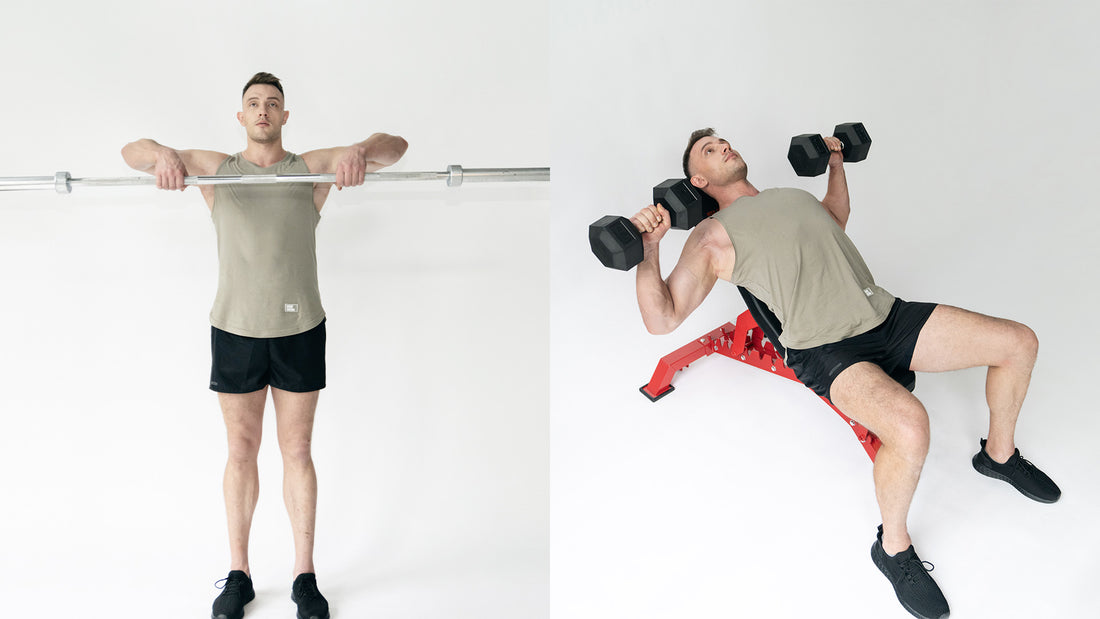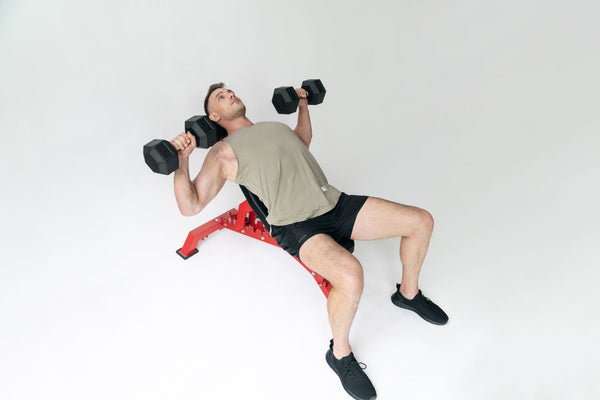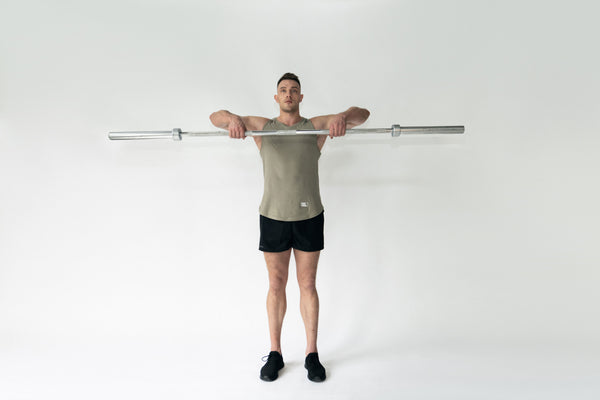
Barbells and dumbbells are two of the most common pieces of fitness equipment; a home gym really isn't complete unless it contains both dumbbells and barbells. However, there are occasions and exercises where it is better to use dumbbells while in other cases, it is more efficient to build strength and build muscle with a barbell.
Whether you are more focused on strength training or are interested in targeting very specific muscle groups, knowing whether a barbell or dumbbell is the best tool for the job is important for reaching your fitness goals. We'll discuss the merits of different barbell exercises and dumbbell exercises as well as the general benefits of dumbbells vs barbells.
Benefits of Dumbbells
Dumbbells don't usually allow for as much weight to be used as other lifting implements. However, the numerous benefits of using dumbbells far outweighs this shortcoming:
- Range of Motion: When discussing the major benefits of dumbbells, the most prominent benefit is always related to the superior range of motion (ROM) dumbbells allow. With equipment such as barbells, plates are affixed in one place and must all move together. With dumbbells, lifters move each weight individually, allowing for much more variety and flexibility when performing comparable exercises (ex. dumbbell bench press vs. barbell bench press).
- Single arm focus: Most lifters are stronger, at least in some exercises, with one side or arm more than the other. While small muscle imbalances are normal, problems can arise if the asymmetry becomes too excessive. Dumbbells can help to address these imbalances by allowing lifters to use different loads when performing the same exercises (ex. performing single-arm overhead presses with a heavier dumbbell in one arm).
- Isolation exercises: Barbells are great for targeting big muscle groups and large swaths of muscles in single exercises. However, compared to dumbbells, they are much less effective at targeting smaller muscles and performing isolation work on specific muscles. Additionally, oftentimes, these exercises only allow for small loads to be used, making them impossible to perform with larger, heavier Olympic barbells.
Ultimately, dumbbells are the perfect tools when the task calls for more deliberate and isolated muscle and strength work.

Benefits of Barbells
When it is time to load the weight on for the heaviest sets, it's time to use a barbell. The benefits of barbell use cannot be understated:
- Heavy Compound Exercises: Compound exercises, movements that use many muscles groups collectively, are extremely effective and efficient for muscle growth. Barbells allow lifters to use the maximum amount of weight for exercises such as the bench press, squat, shoulder press, lunge, and deadlift, rocketing their overall gains.
- Stability: During barbell movements, the weight is largely fixed and stabilized. Lifters only need to concentrate on pushing or pulling the barbell since the load is perfectly balanced. This allows lifters to safely use heavier loads.
- Variety: Barbells are engineered in a large variety of ways making some more advantageous for powerlifting, Olympic weightlifting, or other specialty purposes. Adjustable dumbbells are certainly useful pieces of equipment, but they don't compare to the array of barbells available for every conceivable fitness task or objective.
Barbells are great when you want to work multiple muscle groups and build serious levels of strength and muscle.

Common Barbell and Dumbbell Exercises
Despite their differences, there is a lot of overlap between many common barbell and dumbbell exercises. Here are a few exercises where the set-up and movement patterns are very similar when working barbells or dumbbells:
- Barbell bench press; dumbbell bench press
- Barbell seated press; dumbbell seated press
- Barbell row; dumbbell row
- Barbell deadlift; dumbbell deadlift
- Barbell overhead squat; dumbbell overhead squat
There are a number of other similar exercises with common elements in their dumbbell and barbell varieties, although most of these involve different set-ups/starting points and/or different movement patterns.
Dumbbells vs Barbells or Dumbbells and Barbells?
When discussing the advantages of dumbbells and answering the question "what's better about barbells?" there have been definite benefits highlighted of both pieces of classifications of fitness equipment. However, just because barbells allow you to lift a little more weight and with just a pair of dumbbells you can perform a lot of different exercises, doesn't mean you should limit yourself to only dumbbells or barbells.
Consider the compounded effects of training with dumbbells and barbells, enjoying the benefits of both. By including barbell and dumbbell exercises in your training, you will be able to maximize strength and muscle gains and target all of your less-worked body parts.
Already have your barbells and dumbbells and are ready to get training? Consider using a progressive overload approach to help you bust through plateaus and make consistent power and strength gains!
Frequently Asked Questions
We want you to be completely comfortable in your fitness journey with whichever equipment you decide to use. Let's look over a few more common questions to help you decide which equipment is best for you.
1. Should I perform barbell exercises or should I use dumbbells to rehab injuries?
Before embarking on any type of post-injury rehab work, you should consult with your doctor and/or other licensed professional.
2. Are barbells or dumbbells better for muscle gains and overall muscle growth?
When overall growth is desired, lifters should use barbells for building muscle mass. In contrast, dumbbells are a better option when the desired muscle gains and growth are in smaller and more isolated muscles and muscle groups.
3. What are the main differences between barbells and dumbbells when performing the competition power lifts?
While dumbbells are great for targeting smaller and lagging muscles, dumbbell versions of the bench press, squat, and deadlift are generally not going to get you the same strength gains that comparable barbell lifts will. In this aspect of the barbell vs dumbbell debate, the former is the clear winner.




















